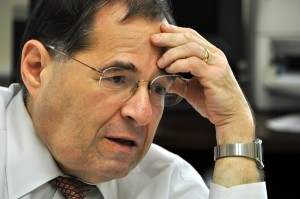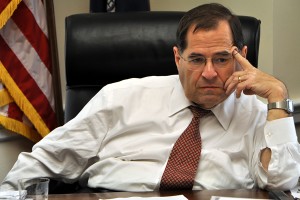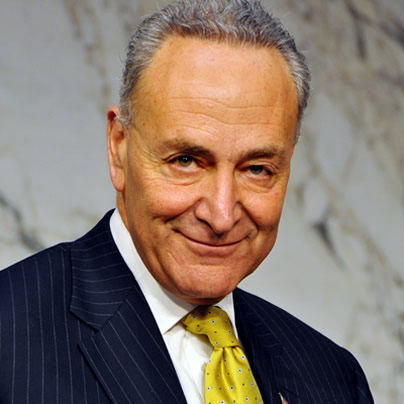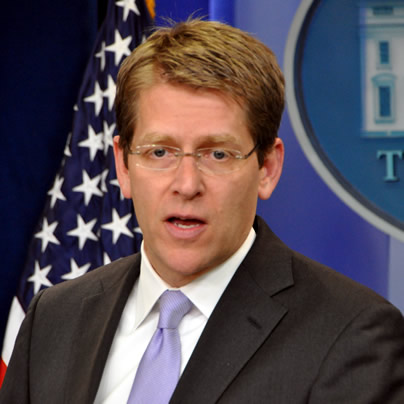National
No DOMA repeal next year: Nadler

Rep. Jerrold Nadler said the Respect for Marriage Act, which would overturn the Defense of Marriage Act, won’t pass next year. (DC Agenda photo by Michael Key)
The sponsor of a bill that would overturn the Defense of Marriage Act said repeal won’t happen in this Congress and that efforts next year will instead be focused on building support on the issue.
Rep. Jerrold Nadler (D-N.Y.) said in an interview with DC Agenda that lawmakers will work on passing other pro-LGBT bills next year, and could take up legislation to repeal DOMA — known as the Respect for Marriage Act — at the end of the two-year session starting in 2011.
“The Respect for Marriage Act is a bill that we can’t pass right now; we know we can’t pass it right now,” he said.
Nadler said Congress won’t take up the DOMA repeal next year because other LGBT-related bills, including the Employment Non-Discrimination Act, legislation providing partner benefits for LGBT federal workers and a repeal of “Don’t Ask, Don’t Tell,” are taking precedence. Supporters hope to pass those measures by the end of 2010.
“The Respect for Marriage Act comes up after that, maybe at the end of the next Congress, maybe afterward,” he said.
Nadler’s legislation would overturn DOMA, allowing the federal government to recognize same-sex marriages. It also has a “certainty provision” that would allow same-sex couples to marry in one state and still receive federal benefits even if they move to another state where gay nuptials aren’t recognized.
In lieu of passage in this Congress, Nadler said the task for supporters is to find more co-sponsors for the bill. As of Tuesday, the bill had 105 co-sponsors. Nadler predicted support would grow.
“And I think if some of these other bills pass, it’ll become more — the idea becomes less avant garde,” he said.
In response to Nadler’s remarks that a DOMA repeal won’t happen next year, Evan Wolfson, executive director of Freedom to Marry, said, “I don’t think we should begin the conversation about when it’s going to happen. I think we should begin the conversation with how do we build support and make it happen.”
“There are two ways to talk about our movement,” he said. “One is to talk about what it’s really about, to actually make the case for inclusion and fairness and freedom, to talk about why marriage matters. … The other is to spend all our time talking about the chess game or the political horse race, and we spend too much time on the latter and not enough time doing the former.”
Wolfson said supporters should begin the conversation “by each one of us calling our senators and member of Congress, asking them to sign on to the bill.”
Strategic decisions
Nadler’s prediction that a DOMA repeal won’t happen by the end of next year comes after other key potential supporters have said other LGBT legislation will be a priority.
At the time the Respect for Marriage Act was introduced in September, Drew Hammill, a spokesperson for House Speaker Nancy Pelosi, said the speaker is “focused on legislative items that we can enact into law now,” including ENDA.
And gay Rep. Barney Frank (D-Mass.) hasn’t signed on as a co-sponsor to Nadler’s bill, saying that lawmakers will instead focus on other LGBT issues this Congress and the bill’s certainty provision could cause political problems for House members seeking re-election.
Nadler said he hasn’t “had too many conversations” with Pelosi on the proposed DOMA repeal since it was introduced, but noted that the speaker has privately encouraged House members to co-sponsor the bill.
As for Frank, Nadler also said he hasn’t spoken much with the Massachusetts lawmaker on the issue since the bill’s introduction.
“We have a disagreement on the strategy on this obviously, as we had a disagreement on the strategy over the non-inclusive ENDA last [Congress] where we no longer have that disagreement,” he said. “And, I presume, in the end, we will not have a disagreement on this.”
Although supporters have said other bills will take priority this Congress, advocates for the DOMA repeal have hoped for congressional hearings on marriage by the end of next year.
But Nadler, who chairs a House Judiciary subcommittee with jurisdiction over marriage, said he wouldn’t commit to holding hearings on the issue by the end of next year and would hear only testimony “when we think it’s advantageous to do so.”
“And that’s a strategic decision, a tactical decision you have to make,” he said. “As things go on, we’ll have to see how things go. Right now, the thing is get the idea out there to get pressure built, to get more sponsors — and that’s the way to go.”
Asked whether Democratic leadership requested that he not hold hearings on marriage, Nadler replied, “No, they did not.”
Nadler said he expects a Senate companion to the Respect for Marriage Act would be introduced early next year, noting there are a number of potential sponsors for the Senate legislation.
Advocates have named Sen. Russ Feingold (D-Wisc.) as a prime target in talks because he chairs a Senate Judiciary subcommittee with jurisdiction over marriage. Nadler said Feingold would “possibly” champion the Senate legislation.
Nadler said a Senate bill has yet to emerge so many months after the House introduction in September because potential supporters have been occupied with other tasks.
“Some of the people we’re dealing with are very busy with a number of other things,” he said. “There’s not a sense of urgency, the sense that this bill has to have a Senate sponsor right now because it’s going to pass right now, because it’s not, so we’re talking.”
Even without a sense of urgency among lawmakers, Nadler said he thinks DOMA should be repealed because it’s “a stain on the national honor.”
“Even if you didn’t have a lot of practical effects, which obviously it does have, it’s wrong to keep such things on the books,” he said. “The honor of the country demands we repeal it.”
Same-sex marriage is only legal in five states throughout the country, but Nadler predicted that number would grow in coming years, and would include his home state of New York.
The Empire State was seen to be on the precipice of legalizing same-sex marriage, but the hopes of supporters were dashed last week when the state Senate killed a bill that would have granted marriage rights for same-sex couples. Nadler, who served in the New York Assembly for 16 years before being elected to Congress, said same-sex marriage will nonetheless be legalized in the state in a few years.
“I’d be very surprised if New York didn’t pass a gay marriage bill in the next two years, and I’ve been studying New York politics for 40 years,” he said. “And as long as we keep a Democratic governor and state Senate in the next election, we’ll get a gay marriage bill relatively soon in New York.”
As the number of states with same-sex marriage grow, Nadler said support for the Respect for Marriage Act also will build.
“Especially as a number of states have gay marriage, and the sky doesn’t fall in, and nobody comes in and busts up regular marriages — other than what’s busting up anyway — I think the issue will recede in the sense that people will lose their sense of the novelty,” he said.

Rep. Jerrold Nadler said of his home state that ‘as long as we keep a Democratic governor and state Senate in the next election, we’ll get a gay marriage bill relatively soon in New York.’ (DC Agenda photo by Michael Key)
Gay immigration bill could join reform debate
Another bill Nadler is championing in the House is the Uniting American Families Act, which would enable gay Americans to sponsor their foreign partners for residency. With an effort to pass comprehensive immigration reform expected in Congress next year, advocates are trying to include UAFA as a provision in the larger legislation.
Nadler said the White House seems to want to take on immigration reform in the spring and said UAFA supporters will “make a major thrust to make this part of the comprehensive immigration reform debate.”
The lawmakers drafting comprehensive immigration reform legislation are Rep. Zoe Lofgren (D-Calif.), Rep. Luis Gutierrez (D-Ill.) and Sen. Chuck Schumer (D-N.Y.). Nadler said it’s “hard to say” whether those bills would include a UAFA provision upon their introduction.
“There are a lot of cross pressures and we haven’t had those — we’ve started but we haven’t finished those conversations at this point,” he said.
But Steve Ralls, a spokesperson for Immigration Equality, said he’s “optimistic” immigration reform measures will include UAFA at their debut because supporters, including other lawmakers, immigration groups and LGBT groups, have been lobbying for an inclusive bill for some time.
“I don’t know what the final comprehensive immigration reform will look like, but I remain optimistic that it will include lesbian and gay families,” he said.
In the event that comprehensive immigration reform legislation doesn’t include UAFA when it debuts, Nadler said he’s working on making sure there are votes in the House Judiciary Committee to amend the bill to include such a provision.
Nadler said he’s “hopeful” there will be enough votes for an amendment, but added “that’ll be a big fight, if necessary.”
“I haven’t taken any votes or whip counts or done any kind of that work, but certainly it will be something that we’ll have to work at and the gay community and everybody will have to be pressuring the individual members of the committee,” Nadler said. “A lot of the members of the committee, the Democratic members especially, say they’re very great friends with the gay community … and this’ll be an opportunity to show that they are, bar none.”
One major obstacle that UAFA supporters will face is opposition from Catholic leaders. The U.S. Conference of Catholic Bishops has urged lawmakers to exclude the provision from immigration reform because church leaders support reform, but oppose the LGBT-specific provision.
Nadler said opposition to UAFA from Catholic leaders will make inclusion of the measure in the bill “a very difficult fight.”
“So, there will be some who will be tempted to say, ‘Wait a minute, let’s not alienate some of our major supporters on this legislation to pass it,’” he said. “There’ll be others of us saying, ‘Hey, no, if you’re doing a comprehensive bill, it’s got to be comprehensive. You can’t just leave certain people out.”
Even with opposition from Catholic leaders, Ralls said the list of religious groups who support the inclusion of UAFA in immigration reform “is very long and diverse,” and includes Quakers and Episcopalians.
“If the Conference of Catholic Bishops decides that they’re willing to throw the immigrant community under the bus because of the inclusion of LGBT couples, I think that would be a shame because, at the end of the day, immigration reform can help millions of families — both gay and straight — and that should be Congress’ priority.”
Asked whether he would support immigration reform legislation that doesn’t include a UAFA provision, Nadler replied, “I hope it doesn’t come to that.”
“All my efforts are designed to make sure it doesn’t come to that, so I’m not going to get into what happens at that point,” he said.
‘We will see a fair amount of action’
During his Agenda interview, Nadler also addressed arguments that the Obama administration and Congress haven’t made sufficient progress on LGBT issues since the start of this year.
The lawmaker said Congress has had a significant workload this year — including the passage of two annual budgets as well as stimulus and relief legislation for financial institutions — and that advocates for LGBT issues would be better to make judgments on Congress’ work at the end of next year.
“I think it would be very fair by the time the election rolls around next October to say we haven’t done enough on these issues,” he said. “I think a lot of things have been fermenting and cooking. I think we will see a fair amount of action on these issues in next year’s session.”
Asked whether President Obama could have spoken more forcefully on LGBT issues since the start of his administration, Nadler replied, “I think he could have been more forthright on some of them.” He declined to elaborate.
In response to recent criticism that lawmakers have been putting off action on ENDA, Nadler said some key supporters of the bill have been occupied with other issues. He noted the sponsor of the bill is Frank, who, as chair of the House Financial Services Committee, is also working on the Troubled Asset Relief Program legislation.
“Why aren’t we doing ENDA right now?” he said. “But what else are some of the key people doing? They’re over their heads with the financial reform, which no one anticipated six months ago. I suspect that once that is out of the way, which it should be soon, these kind of issues can come to the fore again.”
But John Aravosis, a gay blogger who has been leading an LGBT boycott of the Democratic National Committee, criticized the notion that Congress hasn’t acted on LGBT issues because lawmakers have been busy with other issues.
He said the Obama administration has found time to take swipes at the LGBT community by defending DOMA in court and, more recently, saying it couldn’t follow a court order from the Ninth Circuit judge to provide health benefits to the partner of a lesbian federal employee.
“It’s not enough just for them to say, ‘It’s been busy,’” he said. “Well, it hasn’t been busy — or so busy that they couldn’t take swipes at us.”
Aravois commended Nadler for being outspoken on LGBT issues, but questioned whether Nadler would criticize a Democratic Congress as a Democratic lawmaker, and whether Congress would, in fact, take up LGBT issues next year.
“Good luck passing gay rights legislation right before an election,” he said. “Democrats don’t have balls in off years — they certainly don’t have them right before elections, on gay issues especially.”
With regard to the LGBT legislation that Congress would take up next year, Nadler expressed uncertainty about the prediction that Congress would repeal “Don’t Ask, Don’t Tell” next year as part of the authorization bill for the fiscal year 2011 defense budget. Frank told the media last month that was the way he envisioned repeal.
But Nadler said repeal through the defense budget might not be the best way to overturn “Don’t Ask, Don’t Tell.” With the president calling for escalation of operations in Afghanistan, Nadler said such a provision would put more liberal members of Congress in a quandary over whether to vote for repeal and military operations at the same time.
“You don’t want to put people in the position of saying, ‘You vote against Afghanistan funding, you’re voting against [repealing] “Don’t Ask, Don’t Tell,”’ or vice-versa,” he said. “So maybe you need a new option or something. These are tactical considerations, which you have to look at as things unfold.”
Nadler said he, for example, didn’t “like this idea of sending more troops to Afghanistan,” although he supports a “Don’t Ask, Don’t Tell” repeal.
With public approval polls showing support waning for Democrats, Nadler predicted congressional Democrats will lose seats in the 2010 election, but added a hope that the party won’t lose “too many” seats. He noted that the November results would largely depend on how well the economy is faring.
Even with Democrats potentially in danger, Nadler said he didn’t think lawmakers would avoid LGBT issues next year to reduce a perceived risk of alienating voters before the election.
“I think we’re going to face most of these issues this Congress, mostly next year,” he said. “I’m assuming that the gay community is going to keep the pressure on. I mean, don’t go to sleep because I said it as that. If the gay community keeps the pressure on, then I think that, yes, we’ll probably face most of these issues.”
State Department
State Department releases annual human rights report
Antony Blinken reiterates criticism of Uganda’s Anti-Homosexuality Act

Secretary of State Antony Blinken on Monday once again reiterated his criticism of Uganda’s Anti-Homosexuality Act upon release of the State Department’s annual human rights report.
“This year’s report also captures human rights abuses against members of vulnerable communities,” he told reporters. “In Afghanistan, the Taliban have limited work opportunities for women, shuttered institutions found educating girls, and increasing floggings for women and men accused of, quote, ‘immoral behavior,’ end quote. Uganda passed a draconian and discriminatory Anti-Homosexuality Act, threatening LGBTQI+ individuals with life imprisonment, even death, simply for being with the person they loved.”
Ugandan President Yoweri Museveni last May signed the law, which contains a death penalty provision for “aggravated homosexuality.”
The U.S. subsequently imposed visa restrictions on Ugandan officials and removed the country from a program that allows sub-Saharan African countries to trade duty-free with the U.S. The World Bank Group also announced the suspension of new loans to Uganda.
Uganda’s Constitutional Court earlier this month refused to “nullify the Anti-Homosexuality Act in its totality.” More than a dozen Ugandan LGBTQ activists have appealed the ruling.
Clare Byarugaba of Chapter Four Uganda, a Ugandan LGBTQ rights group, on Monday met with National Security Council Chief-of-Staff Curtis Ried. Jay Gilliam, the senior LGBTQI+ coordinator for the U.S. Agency for International Development, in February traveled to Uganda and met with LGBTQ activists who discussed the Anti-Homosexuality Act’s impact.
“LGBTQI+ activists reported police arrested numerous individuals on the basis of their sexual orientation or gender identity and subjected many to forced anal exams, a medically discredited practice with no evidentiary value that was considered a form of cruel, inhuman, and degrading treatment and could amount to torture,” reads the human rights report.
The report, among other things, also notes Ugandan human rights activists “reported numerous instances of state and non-state actor violence and harassment against LGBTQI+ persons and noted authorities did not adequately investigate the cases.”
Report highlights anti-LGBTQ crackdowns in Ghana, Hungary, Russia
Ghanaian lawmakers on Feb. 28 approved the Promotion of Proper Human Sexual Rights and Ghanaian Family Values Bill. The country’s president, Nana Akufo-Addo, has said he will not sign the measure until the Ghanaian Supreme Court rules on whether it is constitutional or not.
The human rights report notes “laws criminalizing consensual same-sex sexual conduct between adults” and “crimes involving violence or threats of violence targeting lesbian, gay, bisexual, transgender, queer or intersex persons” are among the “significant human rights issues” in Ghana.
The report documents Hungarian Prime Minister Viktor Orbán and members of his right-wing Fidesz party’s continued rhetoric against “gender ideology.” It also notes Russia’s ongoing crackdown against LGBTQ people that includes reports of “state actors committed violence against LGBTQI+ individuals based on their sexual orientation or gender identity, particularly in Chechnya.”
The report specifically notes Russian President Vladimir Putin on July 24 signed a law that bans “legal gender recognition, medical interventions aimed at changing the sex of a person, and gender-affirming care.” It also points out Papua New Guinea is among the countries in which consensual same-sex sexual relations remain criminalized.

The Cook Islands and Mauritius in decriminalized homosexuality in 2023.
The report notes the Namibia Supreme Court last May ruled the country must recognize same-sex marriages legally performed outside the country. The report also highlights the Indian Supreme Court’s ruling against marriage equality that it issued last October. (It later announced it would consider an appeal of the decision.)
Congress requires the State Department to release a human rights report each year.
The Biden-Harris administration in 2021 released a memorandum that committed the U.S. to promoting LGBTQ+ and intersex rights abroad.
The full report can be read here.
National
Same-sex couples vulnerable to adverse effects of climate change
Williams Institute report based on Census, federal agencies

A new report by the Williams Institute at the UCLA School of Law finds that same-sex couples are at greater risk of experiencing the adverse effects of climate change compared to different-sex couples.
LGBTQ people in same-sex couple households disproportionately live in coastal areas and cities and areas with poorer infrastructure and less access to resources, making them more vulnerable to climate hazards.
Using U.S. Census data and climate risk assessment data from NASA and the Federal Emergency Management Agency, researchers conducted a geographic analysis to assess the climate risk impacting same-sex couples. NASA’s risk assessment focuses on changes to meteorological patterns, infrastructure and built environment, and the presence of at-risk populations. FEMA’s assessment focuses on changes in the occurrence of severe weather events, accounting for at-risk populations, the availability of services, and access to resources.
Results show counties with a higher proportion of same-sex couples are, on average, at increased risk from environmental, infrastructure, and social vulnerabilities due to climate change.
“Given the disparate impact of climate change on LGBTQ populations, climate change policies, including disaster preparedness, response, and recovery plans, must address the specific needs and vulnerabilities facing LGBTQ people,” said study co-author Ari Shaw, senior fellow and director of international programs at the Williams Institute. “Policies should focus on mitigating discriminatory housing and urban development practices, making shelters safe spaces for LGBT people, and ensuring that relief aid reaches displaced LGBTQ individuals and families.”
“Factors underlying the geographic vulnerability are crucial to understanding why same-sex couples are threatened by climate change and whether the findings in our study apply to the broader LGBTQ population,” said study co-author Lindsay Mahowald, research data analyst at the Williams Institute. “More research is needed to examine how disparities in housing, employment, and health care among LGBT people compound the geographic vulnerabilities to climate change.”
Read the report
Federal Government
Lambda Legal praises Biden-Harris administration’s finalized Title IX regulations
New rules to take effect Aug. 1

The Biden-Harris administration’s revised Title IX policy “protects LGBTQ+ students from discrimination and other abuse,” Lambda Legal said in a statement praising the U.S. Department of Education’s issuance of the final rule on Friday.
Slated to take effect on Aug. 1, the new regulations constitute an expansion of the 1972 Title IX civil rights law, which prohibits sex-based discrimination in education programs that receive federal funding.
Pursuant to the U.S. Supreme Court’s ruling in the landmark 2020 Bostock v. Clayton County case, the department’s revised policy clarifies that discrimination on the basis of sexual orientation and gender identity constitutes sex-based discrimination as defined under the law.
“These regulations make it crystal clear that everyone can access schools that are safe, welcoming and that respect their rights,” Education Secretary Miguel Cardona said during a call with reporters on Thursday.
While the new rule does not provide guidance on whether schools must allow transgender students to play on sports teams corresponding with their gender identity to comply with Title IX, the question is addressed in a separate rule proposed by the agency in April.
The administration’s new policy also reverses some Trump-era Title IX rules governing how schools must respond to reports of sexual harassment and sexual assault, which were widely seen as imbalanced in favor of the accused.
Jennifer Klein, the director of the White House Gender Policy Council, said during Thursday’s call that the department sought to strike a balance with respect to these issues, “reaffirming our longstanding commitment to fundamental fairness.”
“We applaud the Biden administration’s action to rescind the legally unsound, cruel, and dangerous sexual harassment and assault rule of the previous administration,” Lambda Legal Nonbinary and Transgender Rights Project Director Sasha Buchert said in the group’s statement on Friday.
“Today’s rule instead appropriately underscores that Title IX’s civil rights protections clearly cover LGBTQ+ students, as well as survivors and pregnant and parenting students across race and gender identity,” she said. “Schools must be places where students can learn and thrive free of harassment, discrimination, and other abuse.”
-

 South America3 days ago
South America3 days agoDaniel Zamudio murderer’s parole request denied
-

 Maryland4 days ago
Maryland4 days agoMontgomery County police chief discusses arrest of trans student charged with planned school shooting
-

 Politics5 days ago
Politics5 days agoCourt records raise concerns about right-wing TikTok investor’s influence
-

 Commentary4 days ago
Commentary4 days agoWorld ‘isn’t much different today’









